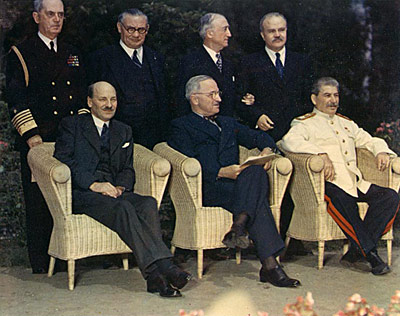
Unit 5: Crisis and Change
Lesson G: Theaters and Consequences of World War II
Activity 7: Independence for African Colonies After World War II - A Case Study
World War II (1939-1945) had a major impact on Africa. Some important battles were waged in North Africa. Many Africans from British and French colonies were recruited to fight for the Allies in Europe, Asia, and North Africa. When recruiting African soldiers, the colonizing countries emphasized that soldiers would be helping to protect the world against the evils of fascism and Nazism. At the end of the war, the important question on the minds of Africans, particularly the returning soldiers, was "Why should I give my life to keep America and Europe free, when I am not free in my own country?" Most Africans would not consider life as colonial subjects to be that different from life under Nazism or fascism.
Returning soldiers and other Africans were aware of the promise made by the Atlantic Charter, which stated the principles guiding the Allied war effort, according to Winston Churchill and Franklin Roosevelt in 1941. The third paragraph of the Charter states that the Allies "respect the right of all peoples to choose the form of government under which they will live; and they will wish to see sovereign rights of self-government restored to those who have been forcibly deprived of them." Africans claimed this to be a commitment also to the peoples of Africa and a call to end colonial rule.
Before a peace treaty could be completed with Italy, the question of what to do with Italian colonies had to be addressed. At the Potsdam Conference in 1945, the Allies agreed that the Italian colonies seized during World War II should not be returned to Italy.

Clement Attlee, Harry Truman and Joseph Stalin at the Potsdam Conference, July 1945 [1]
Classroom Activity - The Role of the United Nations in African Colonial Independence
Directions: Read Libyan Independence Case Study to demonstrate the many political moves by different countries.
Download the Student Resource: Libyan Independence Case Study (pdf).
![]() Discussion
Discussion
Directions: Prepare a response to the discussion questions below. Use your notes from the Student Resource: MAIN in Africa and this activity's reading to support your points. Follow your teacher's directions to participate in your class discussion.
- What do you think the role of countries like Great Britain, the U.S.S.R., and the United States should be in the independence of colonized countries like Libya?
- Is an organization like the United Nations a better choice to determine which countries are "ready for independent rule" or home rule?
- Should anyone external to a country make this decision?
Select the link to review the Discussion Scoring Tool (pdf).
Page Notes:
[1] Source: This image from http://en.wikipedia.org/wiki/File:Potsdam_conference_1945-8.jpg is in the public domain.

